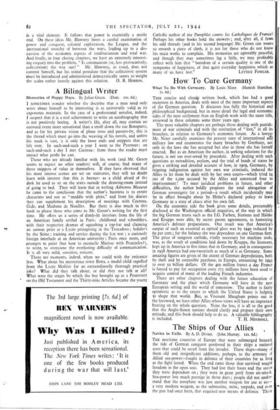How To Cure Germany
THIS concise and clearly written book, which has had a good reception in America, deals with most of the more important aspects of the German question. It discusses less fully the historical and philosophical background, but in more detail the legal and economic sides of the next settlement than an English work with the same title, reviewed in these columns some three years ago.
The most valuable chapters are perhaps those dealing with punish- ment of war criminals and with the restitution of "loot," in all its branches, in relation to Germany's economic future. As a lawyer Mr. Nizer carefully examines the present state of international and military law and enumerates the many breaches by Gerffiany, not only in the laws she has accepted but also in those she has herself enacted. But as an American the author, in seeking solutions for the future, is not too over-awed by precedent. After dealing with such questions as extradition, asylum, and the trial of heads of states he gives a striking and detailed account of how, in 1919, Germany, by feigning indignation against her own war criminals, induced the Allies to let them be dealt with by her own courts—which tried 14 out of the 1,5oo accused by the Allies and sentenced four to imprisonment ! To meet juridical problems in future, and other difficulties, the author boldly proposes the total abrogation of German sovereignty for a period—a result which incidentally may be in effect brought about by Hitler's declared policy to leave Germany in a state of chaos after his own fall.
On the economic side the book gives some details, presumably disclosed at the Washington official enquiries, of the way in which the big German trusts such as the I.G. Farben, Siemens and Halske and Krupps were able, by secret patent agreements, to hamstring America's defence preparations. One result was that America's output of such an essential as optical glass was by 194o redUced by 6o per cent.; for the balance she was dependent on one German firm. The price of tungsten carbide, vitally necessary for machine tools, was, as the result of conditions laid down by Krupps, the licensees, kept up in America to five times that in Germany, and in consequence in 1938 America had one-twentieth as much of it as Germany. Some amazing figures are given of the extent of German depredations, both by theft and by ostensible purchase, in Europe, amounting by 1943 to over 5o billion dollars. Of the 40o million francs a day France is forced to pay for occupation costs 275 millions have been used to acquire control of many of the leading French industries.
There are other chapters dealing with the future education of Germany and the place which Germany will have in the new European setting and the world of tomorrow. The author is fairly optimistic as to the extent to which the United States is helping to shape that world, But, as Viscount Maugham points out in the foreword, we have other Allies whose views will have an important bearing on the whole question. None the less, it is all to the good that the Anglo-Saxon nations should clarify and prepare their own attitude, and this book should help to do so. A valuable bibliography






















 Previous page
Previous page